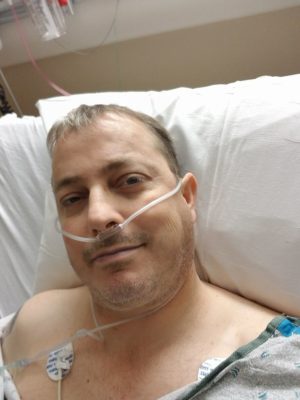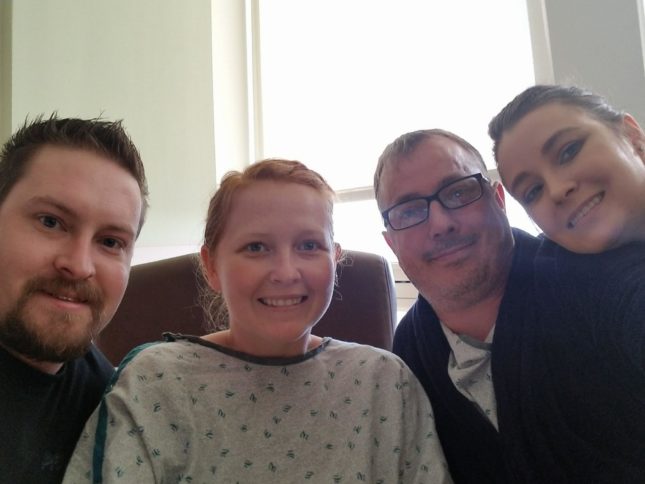“It’s crazy how much better you feel, even that fast,” says Lake Ozark Police Detective Shane Pierce about his recent kidney transplant here at Barnes Hospital. “I was up walking by midnight, and I just felt great. I could tell the kidney was getting rid of all the toxins.”

Detective Shane Pierce before his kidney transplant.

Detective Shane Pierce after his kidney transplant.
Shane, whose story was previously highlighted here in A Remarkable Gift, was diagnosed with IgA nephropathy (Berger’s Disease) in August 2015. Shane and his wife, Lacey, soon telegraphed his need for a kidney via their Facebook page, A Kidney for Shane. A member of the Lake Ozark community, Cortney Powell, touched by the Pierce family story, decided to be tested. She was a match. Cortney, a wife and mother of four children, donated her kidney to Shane on November 30, 2017.

Cortney Powell, left, with Shane.
“What I wasn’t expecting was that I felt so much better than my donor, Cortney, did,” says Shane. “The doctors had told Cortney about how that was probably going to happen, but I didn’t know that. So, that was the most surprising thing for me.”
Shane points out that because he was used to feeling bad, as soon as he got the healthy kidney he felt great, while Courtney, who was used to feeling healthy, was more affected by the surgery, at least initially.
“So, actually, I had a little bit of guilt about that,” he says. “I’m out walking around, she’s in bed. We were only about five rooms apart from each other on the hospital floor, so I would walk down and see her. But she is up an around now!”
Most of the first month following surgery was spent at home. “The first month they don’t really want you to leave the house because you are taking so many anti-rejection drugs and your immune system is down. But the drugs have been tapered down now.”

Cortney and Shane with their spouses before the operation.
But, staying home wasn’t all bad says the father of four. “It was nice to stay home and enjoy the holidays. I have worked a lot of holidays over my career. It was nice to actually be home.”

Shane was told not to go out after his transplant, to give time for his immunity to build up. Friends sent various care packages so he wouldn’t have to leave the house.
Thinking about life post-transplant, Shane and Cortney have been tossing around ideas about “how to get the word out” about organ donation. One way would be to go to schools or dialysis clinics to discuss organ donation. “So I can tell my side of the story, and Cortney can tell her side of the story,” he says. It would be an opportune setting to let people know what to expect, and to give people the chance to ask Cortney why she decided to donate.
“We are still talking about ideas,” Shane says. “Hopefully, we can convince people that it is the right thing to do, that you can help people. People are dying on the waiting list every year. It doesn’t have to be that way.”